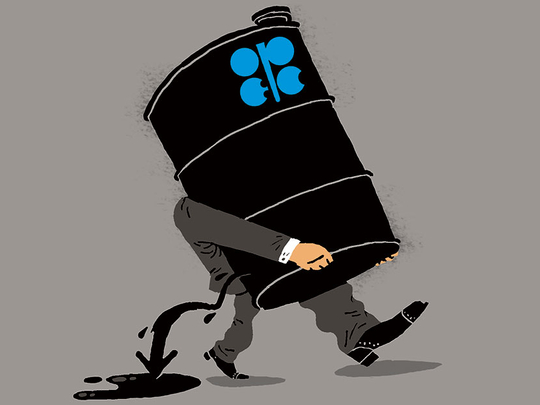
Oil prices have dropped sharply in recent weeks. Prices fell by almost 30 per cent; from approximately $115 (Dh422.40) a barrel last September to a nearly $80 a barrel today and could plunge even further if the Organisation of Petroleum Exporting Countries (Opec) fails agree to a significant output cut last week.
There is no consensus over whether Opec is willing to cut back its production to deal with Asia’s falling oil demand and an increase in oil supply from the US shale boom. Iran, which has limited access to markets because of sanctions, wants a cut in production, as does Venezuela, which needs a higher oil price to meet its massive debt burden.
But Saudi Arabia, which usually makes the sacrifice to keep the organisation strong, is reluctant to make substantive cut production, because that would just give other producers, mainly Russia, more leeway to boost production.
Since its creation in September 1960, Opec has witnessed similar crisis situations but this one seems to be unprecedented. Unlike in the past, the challenge emanates this time from a structural shift in the global oil market wherein some major oil consumers have become major oil producers, chief amongst them being the US.
This shift could deal a fatal blow to Opec, whose very existence was considered in the past by some industrialised nations as a threat. In the West, oil supplies, prices and transport are not seen as mere economic matters but political and strategic questions too. Opec, which controls more than two thirds of world oil reserves and produces some 40 per cent of its needs (30 million bpd), wields more influence in international politics than the West can tolerate.
In 1974, the US, along with other industrialised nations, responded by establishing the International Energy Agency (IAE) to counterbalance Opec’s weight in the international market and loosen its grip on petroleum prices. In parallel, since the 1973 Arab oil embargo, the US has been trying to reduce its reliance on Opec’s oil.
For the US, oil is not scarce, but most of it is controlled by Opec. Hence, the health of the US economy has always been dependent on Opec’s policy concerning price and supplies. With a divide-and-rule approach, however, the US has so far been able to cope with this situation.
In recent years, particularly since the September 11 attacks, challenges increased as the US vulnerability in the energy sector became abundantly clear. Security and oil became so intertwined in the minds of US policymakers that any attempt to separate them was considered impossible. It was hence extremely difficult to decide on whether the US reaction to the September 11 attacks was driven by security concerns or by the drive to establish control over the world’s largest oil reserves. For example, the invasion of Afghanistan resulted in the destruction of a key shelter for Al Qaida, but has also made it easier for the US to reach the oil resources of Central Asia and the Caspian Sea. Two years before the invasion of Afghanistan, it was reported, US oil companies brought rights to almost 75 per cent of the region’s oil and gas output.
Similarly, the occupation of Iraq was largely viewed as an attempt by the US to put the globe’s second-largest oil reserves under its control. In a later stage, the US turned to Africa in a relentless effort to solve the energy question. In recent years, shale oil technology has turned the US into a major producer and could even render it the world’s largest oil producer.
Yet Opec remains key to a stable oil market. Historically, peaks in oil prices have been the results of political crises in the Middle East: the 1973 Arab-Israeli War, the 1979 Islamic Revolution in Iran, the Iran-Iraq War, the Iraqi invasion of Kuwait, and the 2003 US invasion of Iraq.
In most of these cases, Opec was able to increase production and hence moderate the prices. But Opec has not been doing enough to retain its influence. Over the past few decades, Opec members have done little to increase their production capacity, withering away their ability to control the oil market. Instead of using their oil exports, which nearly doubled in value between 2003 and 2013, to develop their oil industry, Opec members have used most of their revenue to repay government debts and buy western weapons.
Differences among Opec members have also weakened the organisation, taking away part of its power. In the coming years, Opec will have to address these issues and try to reassert its influence in the oil market. Success will depend on how the organisation will tackle these challenges at a time when the western powers are more intent on weakening it.
Dr Marwan Kabalan is a Syrian academic and writer.









